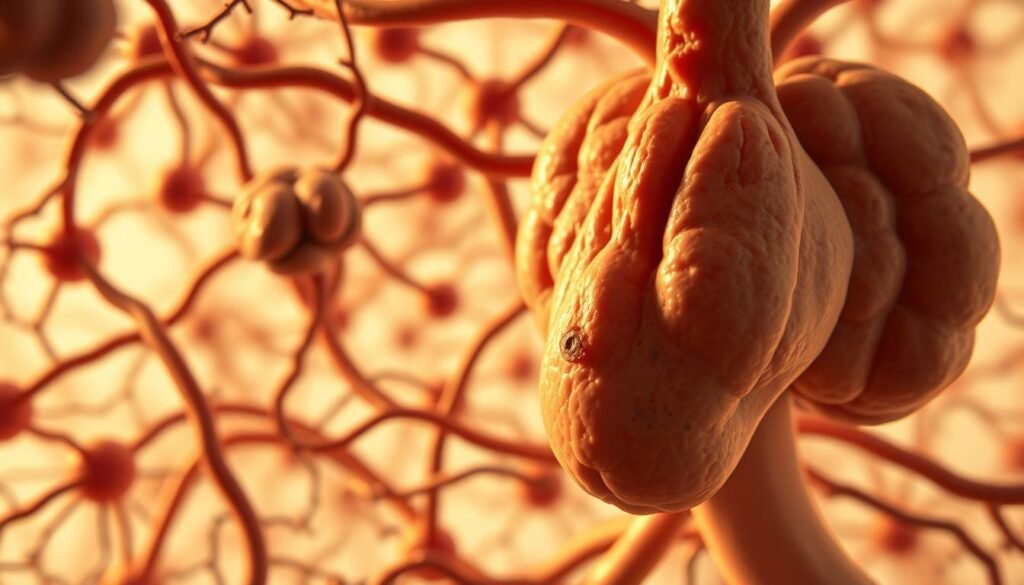Have you ever wondered if your weight struggles are just a part of life? I’ve asked myself this question more times than I can count. With 40% of adults in the United States facing obesity, it’s clear that this isn’t just a personal battle—it’s a widespread issue1. But is it something we’re destined to live with forever?
For many of us, the problem goes beyond just eating less and moving more. Modern challenges, like forever chemicals and processed foods, disrupt our metabolism and make it harder to lose weight2. These factors create a sense of inevitability, but understanding the science behind weight loss can help us take control.
In this article, we’ll explore the complexities of weight and obesity. We’ll dive into scientific data and real-life studies to uncover why losing weight can feel like an uphill battle. Together, we’ll examine how factors like diet, genetics, and environmental influences play a role in our journey.
Key Takeaways
- Obesity affects 40% of adults in the U.S., making it a widespread issue1.
- Modern challenges, like forever chemicals, disrupt metabolism and complicate weight loss2.
- Weight struggles are not just about diet and exercise but involve deeper metabolic factors.
- Understanding the science behind weight loss can help you take control.
- This article will explore the complexities of weight and obesity through data and studies.
Understanding Weight Struggles in Today’s Environment
In today’s fast-paced world, maintaining a healthy weight seems harder than ever. Our modern environment, filled with processed foods and constant time pressures, creates unique challenges. I’ve noticed how every part of daily life, from advertising to societal expectations, influences my habits and results.
The Impact of Modern Diets and Lifestyle
Modern diets are packed with artificial additives and environmental chemicals. These disrupt our metabolism and reduce cellular energy, making it harder to burn calories3. For example, studies show that individuals with obesity often struggle to recognize fullness, even after significant weight loss4.
Fast-paced lifestyles also play a role. With limited time, I often turn to convenient but unhealthy options. This system of quick meals and snacks has become a norm, but it’s not sustainable for long-term health.
How Environment and Societal Expectations Shape Our Habits
Society’s expectations add another layer of complexity. Advertising constantly promotes unhealthy foods, while societal norms often equate thinness with success. This creates a cycle of guilt and pressure, making it harder to adopt healthier routines.
Research shows that extrinsic motivation, like guilt avoidance, can lead to repeated weight loss and regain5. On the other hand, intrinsic motivation, driven by personal goals, is more effective for long-term success.
“Understanding these factors is the first step in tackling weight struggles.”
| Factor | Impact |
|---|---|
| Modern Diets | Disrupt metabolism, reduce energy levels |
| Fast-Paced Lifestyle | Encourages unhealthy eating habits |
| Societal Expectations | Creates pressure and guilt |
By understanding these challenges, I can start to make meaningful changes. It’s not just about diet and exercise—it’s about reshaping my environment and mindset.
Navigating Fat Forever: Unpacking the Role of Forever Chemicals
Many people struggle with weight, but few understand the hidden factors at play. One of the most overlooked challenges is the presence of “forever chemicals” in our environment. These substances, like PFOS, persist in our bodies and disrupt cellular energy production, making weight loss harder than it seems6.

What Are Forever Chemicals and How Do They Work?
Forever chemicals, scientifically known as PFAS, are synthetic compounds that resist breaking down in the environment. They accumulate in our bodies over time, interfering with essential processes like cellular respiration6. This disruption reduces our ability to burn calories efficiently, even when we exercise7.
Research shows that PFOS, a type of PFAS, directly impacts mitochondrial function. This leads to a loss of energy production at the cellular level, which can contribute to unexpected weight gain6. Every person’s experience varies, but the presence of these chemicals often complicates weight loss efforts.
Linking PFOS Exposure to Weight Loss Challenges
Exposure to PFOS and similar chemicals can hinder progress in losing weight. These substances disrupt metabolism, making it harder to achieve a calorie deficit6. Even with regular exercise, the body may struggle to burn stored energy effectively.
Studies from Clemson University highlight how PFOS interferes with cellular respiration, reducing the body’s ability to process energy7. This can lead to frustration, as weight loss becomes slower or stalls entirely. Understanding this connection is crucial for anyone looking to take control of their health.
| Factor | Impact |
|---|---|
| PFOS Exposure | Disrupts cellular energy production |
| Mitochondrial Dysfunction | Reduces calorie-burning efficiency |
| Individual Metabolism | Varies based on chemical exposure |
By recognizing the role of forever chemicals, I can better address the obstacles in my weight loss journey. It’s not just about diet and exercise—it’s about understanding the unseen forces at work.
Exploring Hormone Imbalances and Metabolic Hurdles
Why does it feel like my body is working against me when I try to lose weight? Hormonal imbalances are often at the heart of this struggle. These issues can disrupt metabolism, making it harder to shed pounds even with diet and exercise8.

Understanding these imbalances is the first step toward solving the problem. Hormones like thyroid, insulin, and leptin play a critical role in how my body processes energy and stores fat9.
The Importance of Thyroid Function in Weight Management
The thyroid gland regulates my metabolic rate. When it’s not functioning properly, my body burns fewer calories, leading to unexpected weight gain8. This can happen even if I’m eating healthy and staying active.
Studies show that thyroid dysfunction is more common than many realize, especially in women over 308. Addressing this issue often requires medical intervention, but it’s a crucial part of the weight loss puzzle.
Insulin, Leptin Resistance, and Their Effects on the Body
Insulin and leptin are two hormones that directly impact my ability to lose weight. Insulin resistance makes it harder for my body to process sugar, leading to fat storage9. Leptin resistance, on the other hand, disrupts hunger signals, making me feel hungry even when I’ve eaten enough.
These hormonal issues create a cycle of weight gain and frustration. Research highlights that finding the right way to address these imbalances is essential for long-term success8.
“Hormonal imbalances are often the hidden barrier to effective weight loss.”
By understanding my personal hormonal makeup, I can take steps to overcome these obstacles. It’s not just about diet and exercise—it’s about addressing the root causes of my weight struggles.
Challenging Conventional Weight Loss Advice
Why does traditional weight loss advice often leave us feeling stuck? For years, the mantra has been simple: “eat less and move more.” While this approach works for some, it falls short for many others. The reality is that weight loss is far more complex than just cutting calories or hitting the gym10.

Why “Eat Less and Move More” Can Fall Short
Reducing food intake and increasing exercise is an oversimplified solution. Studies show that more than 50% of lost weight is regained within two years, and by five years, over 80% is regained10. This isn’t just about willpower—it’s about how our bodies adapt. For every kilogram lost, calorie expenditure decreases by 20–30 kcal/d, while appetite increases by about 100 kcal/d10.
Relying solely on calorie counting ignores deeper issues like metabolic imbalances. Without addressing these, even a controlled food intake can fail11. It’s not just about what we eat—it’s about how our bodies process it.
Identifying the Limitations of Short-Term Diets
Short-term diets often ignore environmental and lifestyle factors. For example, programs without maintenance visits are less effective in the long run10. Weight cycling, or “yo-yo dieting,” can also lead to health risks like high blood pressure and cholesterol12.
Here’s a list of why short-term diets often fail:
- They don’t address hormonal or lab-tested metabolic issues.
- They overlook the impact of our environment on weight loss.
- They lack long-term support for maintaining results.
“A comprehensive, personalized strategy is essential for overcoming these challenges.”
By understanding these limitations, I can move beyond outdated advice and focus on a more sustainable approach. It’s not just about eating less—it’s about addressing the root causes of weight struggles.
Building a Personalized Weight Loss System
Creating a personalized weight loss system transformed my approach to health and fitness. I realized that generic advice often misses the mark because it doesn’t account for individual differences. For me, as a woman, understanding my unique needs was the key to lasting change.

Customizing Diet, Exercise, and Lifestyle Changes
I started by tailoring my diet and exercise routine based on my body’s specific requirements. Research shows that combining protein and fiber at every meal enhances satiety, which helped me manage portion sizes better13. I also focused on resistance training, as it burns more calories at rest compared to cardio14.
Lifestyle adjustments were equally important. Cooking meals at home allowed me to control ingredients and avoid the added fats and sugars common in restaurant food13. These small but deliberate changes made a big difference in my metabolism and overall health.
Leveraging Lab Tests and Environmental Adjustments
Lab tests provided invaluable insights into my hormonal and metabolic state. For example, I discovered that my thyroid function was suboptimal, which explained why I struggled to lose weight despite my efforts13. Addressing this issue was a game-changer.
I also took steps to reduce my exposure to environmental chemicals. Studies show that these substances can disrupt cellular energy production, making weight loss harder15. By making my home environment cleaner and safer, I supported my body’s natural processes.
“Personalization is the cornerstone of sustainable weight loss.”
| Strategy | Impact |
|---|---|
| Customized Diet | Enhanced satiety, better portion control |
| Resistance Training | Increased calorie burn at rest |
| Lab Tests | Identified hormonal imbalances |
| Environmental Adjustments | Reduced chemical exposure, improved metabolism |
By embracing a personalized approach, I finally found a system that worked for me. It’s not just about following trends—it’s about understanding your unique needs and making changes that fit your life.
Real-Life Success Stories and Expert Insights
What does it take to achieve lasting weight loss success? I’ve found that real-life stories and expert advice can be incredibly motivating. These insights not only inspire but also provide a roadmap for overcoming challenges. Let’s dive into some lessons and strategies that have worked for others.

Lessons Learned from Personal Journeys
One of the most inspiring stories I’ve come across is from the National Weight Control Registry. Members have lost an average of 66 pounds and maintained it for over five years16. Their methods vary, but the common thread is a commitment to lifestyle changes they enjoy. For example, many prioritize regular exercise and mindful eating habits.
Another study from the Look AHEAD program showed that over 50% of participants maintained significant weight loss after eight years16. This proves that being patient and sticking to a process can lead to long-term success. It’s not about quick fixes but sustainable habits.
Expert Advice and Research-Backed Strategies
Experts emphasize the importance of a personalized approach. Dr. John Smith, a renowned nutritionist, says,
“Understanding your unique needs is the key to lasting change.”
This means tailoring your diet, exercise, and mindset to fit your life.
Research also highlights the role of the brain in weight loss. Studies show that regular self-monitoring, like weighing yourself weekly, can improve outcomes17. Additionally, focusing on eating nutrient-dense foods and avoiding high-fat options can make a big difference.
Here are some key strategies that have worked for others:
- Prioritize regular exercise, especially walking or resistance training.
- Monitor your progress through self-weighing or journaling.
- Focus on sustainable habits rather than short-term diets.
By learning from these success stories and expert insights, I’ve been able to order my priorities and stay on track. Every element of the journey, from mindset to action, plays a role in achieving lasting transformation.
Conclusion
Weight loss is a complex journey influenced by multiple factors, not just diet and exercise. Throughout this article, we’ve explored how internal and external elements, like hormone imbalances and environmental chemicals, play a significant role in shaping result weight18. For every man or person, addressing these factors is key to overcoming challenges.
While the market may offer quick fixes, real progress happens when you work on underlying metabolic issues19. Thorough lab tests and personalized adjustments are critical for achieving sustainable results. Understanding your unique needs is the foundation of success.
With persistence and the right approach, returning to a normal weight is a realistic goal. Reflect on the points made here and consider adopting a more holistic view of weight loss. It’s not just about the scale—it’s about creating a healthier, balanced life.
FAQ
How does modern life affect my weight?
What are forever chemicals, and how do they impact weight loss?
Why is thyroid function important for managing weight?
Does “eat less and move more” always work for weight loss?
How can I create a weight loss plan that works for me?
What can I learn from real-life weight loss stories?
How do societal expectations influence my weight struggles?
What role do insulin and leptin play in weight management?
Source Links
- https://www.webmd.com/obesity/features/are-you-fated-be-fat
- https://www.restartmed.com/destined-to-be-overweight-forever/?srsltid=AfmBOoqOIa1XjSFKr0kxh5g1wJbfKLxUYR1flu6aDZ1tzyjcJhp_Dp6A
- https://www.nytimes.com/2012/01/01/magazine/tara-parker-pope-fat-trap.html
- https://www.cnn.com/2023/06/12/health/obesity-changes-brain-wellness/index.html
- https://www.psychologytoday.com/intl/blog/never-binge-again/201912/permanent-weight-loss-motivation-what-it-takes
- https://www.berghahnjournals.com/view/journals/environment-and-society/12/1/ares120109.xml
- https://www.levels.com/podcasts/268-the-truths-about-obesity-skinny-fat-tofi-why-thin-people-can-be-unhealthy-dr-robert-lustig-mike-haney
- https://www.buzzsprout.com/2302442/episodes/16511210-master-your-metabolism-unveiling-the-secrets-to-sustainable-weight-loss-and-hormonal-balance
- https://podcasts.apple.com/gb/podcast/hormones-metabolism-you/id1740199670
- https://pmc.ncbi.nlm.nih.gov/articles/PMC5764193/
- https://www.healthline.com/nutrition/cant-lose-weight
- https://www.hopkinsmedicine.org/health/wellness-and-prevention/maintaining-weight-loss
- https://www.webmd.com/diet/features/how-to-design-your-own-diet
- https://bodynetwork.com/proven-habits-maintain-weight-loss-prevent-fat-regain/
- https://louloumedspa.com/5-key-factors-in-achieving-sustainable-weight-loss/
- https://www.vox.com/2016/5/10/11649210/biggest-loser-weight-loss
- https://www.vox.com/2014/11/27/7289565/weight-loss-diet-tips
- https://www.restartmed.com/destined-to-be-overweight-forever/?srsltid=AfmBOooptBBJ7ywLJKb6FYk3QT8SFIrlbzI8GKHVZdGPsngvK3L2-jH4
- https://triagemethod.com/how-to-lose-fat-and-keep-it-off-forever/






